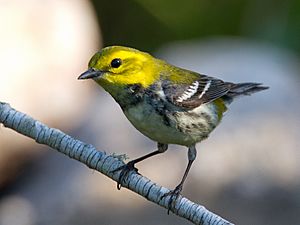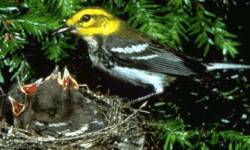Black-throated green warbler facts for kids
Quick facts for kids Black-throated green warbler |
|
|---|---|
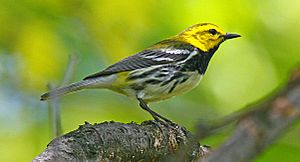 |
|
| Conservation status | |
| Scientific classification | |
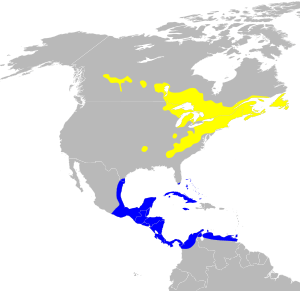 |
|
| Range of S. virens Breeding range Wintering range | |
| Synonyms | |
|
Dendroica virens |
The black-throated green warbler (Setophaga virens) is a small, colorful songbird. It belongs to a group of birds called New World warblers, which are known for their beautiful songs.
What They Look Like
This warbler is easy to spot with its bright colors! It has an olive-green cap on its head and a yellow face with some olive marks. Its back is also olive-green. Below, its feathers are light-colored, with black stripes on its sides. It has a thin, pointy beak and white stripes on its wings.
Male black-throated green warblers have a black throat and chest. Females have a lighter throat, but they still have some black marks on their chest.
Measurements:
- Length: 4.3-4.7 inches (11-12 cm)
- Weight: 0.3-0.4 ounces (7-11 g)
- Wingspan: 6.7-7.9 inches (17-20 cm)
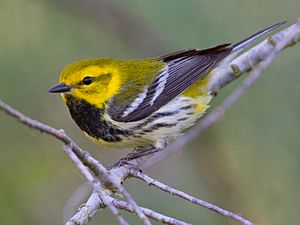
Where They Live and Travel
Black-throated green warblers like to live in coniferous and mixed forests. You can find them breeding in eastern North America and western Canada. They also live in cypress swamps along the southern Atlantic coast.
These birds build their nests like open cups. They usually place them close to the trunk of a tree.
When winter comes, these warblers migrate south. They fly to places like Mexico, Central America, the West Indies, and southern Florida. Some even travel as far as South America, with a few reaching Ecuador.
How They Behave
Black-throated green warblers are very active birds. They search for food in plants and trees. Sometimes they hover in the air to pick up insects, which is called gleaning. Other times, they catch insects while flying, which is called hawking. Insects are their main food, but they will sometimes eat berries too.
You can recognize their song by a buzzy sound. It often sounds like zee-zee-zee-zooo-zeet or zoo-zee-zoo-zoo-zeet. Their call is a short, sharp tsip.
Sometimes, another bird called the brown-headed cowbird lays its eggs in the warbler's nest. This is a type of parasitism, where the cowbird tricks the warbler into raising its young.
See also
 In Spanish: Reinita dorsiverde para niños
In Spanish: Reinita dorsiverde para niños



